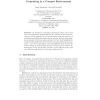Free Online Productivity Tools
i2Speak
i2Symbol
i2OCR
iTex2Img
iWeb2Print
iWeb2Shot
i2Type
iPdf2Split
iPdf2Merge
i2Bopomofo
i2Arabic
i2Style
i2Image
i2PDF
iLatex2Rtf
Sci2ools
122
click to vote
HUC
2004
Springer
2004
Springer
Everyday Encounters with Context-Aware Computing in a Campus Environment
As ubiquitous computing technologies mature, they must move out of laboratory settings and into the everyday world. In the process, they will increasingly be used by heterogeneous groups, made up of individuals with different attitudes and social roles. We have been studying an example of this in a campus setting. Our field work highlights the complex relationships between technology use and institutional arrangements – the roles, relationships, and responsibilities that characterize social settings. In heterogeneous groups, concerns such as location, infrastructure, access, and mobility can take on quite different forms, with very different implications for technology design and use.
Related Content
| Added | 01 Jul 2010 |
| Updated | 01 Jul 2010 |
| Type | Conference |
| Year | 2004 |
| Where | HUC |
| Authors | Louise Barkhuus, Paul Dourish |
Comments (0)

